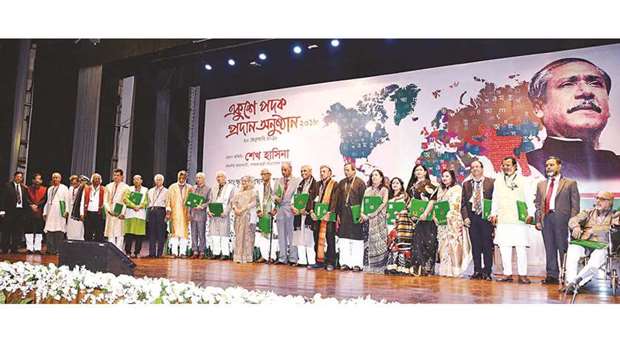“We need to make sure we must not forget our language, culture and tradition. We may have to learn many languages, many things and use newer technologies, but we’ll have to uphold our own distinctive characters. We can move ahead maintaining all this,” she said while presenting Ekushey Padak (awards) at Osmani Memorial Auditorium.
She said the Bangalee, as a nation, has many things to be proud of. “We’ve to preserve those, and publicise those for the future generation.”
Hasina said this should be done so that no one of the Bengalee nation could forget the tradition and culture of the country. “We must uphold the distinctive characters of our
culture, tradition and heritage.”
The prime minister said the new generation must know the nation’s glorious history to be prepared to face the future challenges as Bangladesh will never bow down to others.
She said that after returning to power in 2009, her government has taken numerous projects and programmes since for the overall development of the country and the fate of people.
“That’s why we’ve regained our dignity that was lost after 1975, we’ll gain further in the global arena keeping up that
dignity,” she said.
The prime minister mentioned that she delivers her address in the UN General Assembly in Bangla every year following the footprint of Bangabandhu.
Congratulating the Ekushey Padak recipients, the prime minster hoped that the award will inspire the future generation to do even greater works for people who would learn from them and follow their footsteps.
She said the greatest Ekushey is the symbol of grief, strength and glory in the life of every Bangali. On this day in 1952, many valiant sons of the soil, including Rafiq, Shafique, Salam, Jabbar and Barkat, sacrificed their lives for protecting the dignity of the mother tongue.
Referring to the development taken place in the last eight years in various sectors that made Bangladesh a ‘role model’ for development in the world, Hasina hoped that her government would turn Bangladesh into a middle-income country by 2021 and a developed one by 2041.

